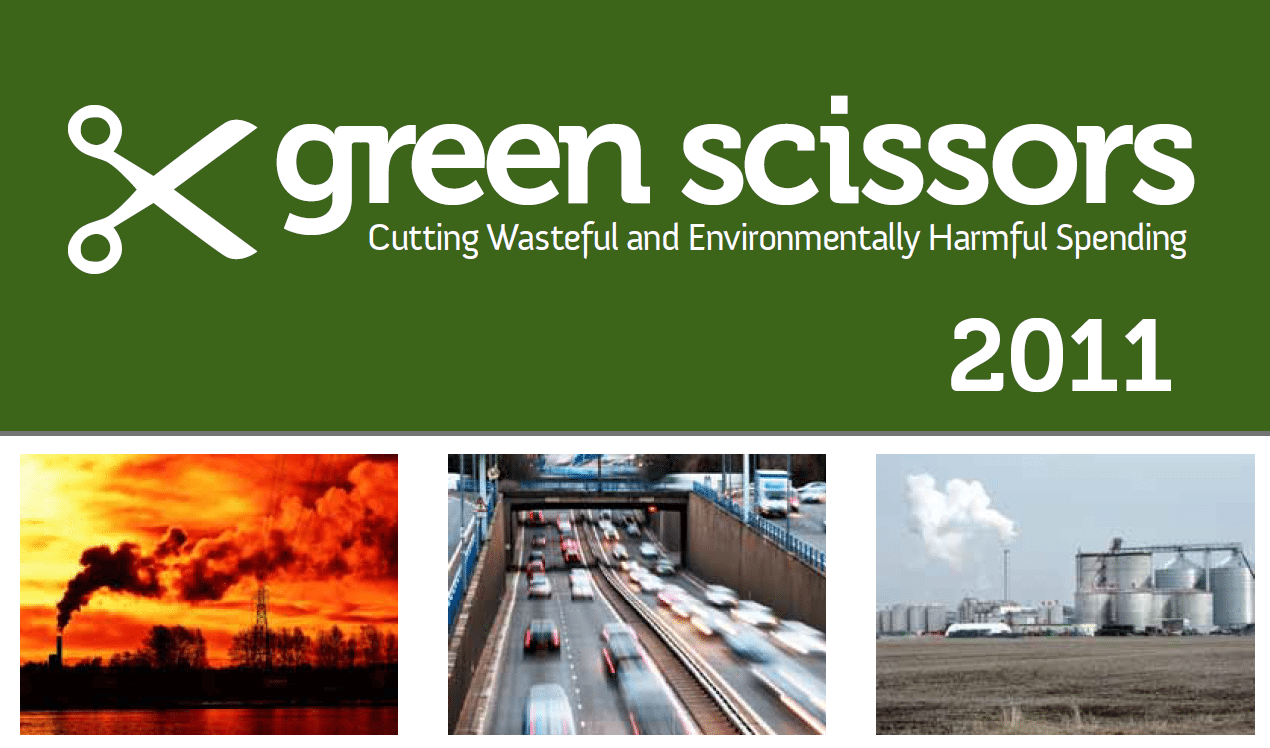Green Scissors 2012 Report
The 2012 report was a collaboration between environmental organization Friends of the Earth, budget watchdog Taxpayers for Common Sense, and free-market think tank R Street.
For more than 18 years the Green Scissors campaign has been a collaboration between budget and environmental groups aimed at eliminating wasteful spending that is harmful to the environment. This year’s report is a collaboration between environmental organization Friends of the Earth, budget watchdog Taxpayers for Common Sense, and free-market think tank R Street. While each group comes to the Green Scissors project with a unique mission, a diverse constituency, and different opinions on the role of government, we join together around one shared goal: exposing and eliminating wasteful and environmentally harmful spending.
Green Scissors is a consensus document; all of our groups believe making the cuts contained in this report would be beneficial, although we see them as only part of the solution. Making the cuts highlighted in Green Scissors 2012 would be an important first step to ending environmentally harmful spending, but even more could and should be done.
In mid-2012, as this report goes to press, its message is particularly urgent. Before the end of the year, enormous annual deficits, a giant federal debt, automatic budget cuts and the expiration of many tax cuts will require Congress to make difficult decisions on taxes and spending. And all sides concede that spending in some areas must be cut. Although certain constituencies will obviously be worse off after any set of cuts, the partners on this report all strongly believe that the cuts in this report will make the country as a whole better off. As such, they should be considered the low-hanging fruit for policymakers looking to pull the United States back from the brink of a fiscal precipice.
This year’s report details nearly $700 billion in cuts from five different areas: energy, federal insurance, agriculture, transportation, and lands and water. Wasteful and environmentally harmful government spending comes in many different forms, including discretionary programs, mandatory programs such as commodity crop payments, tax expenditures, below-market giveaways of public resources, preferential government financing such as loan guarantees, and risk reduction through government insurance and liability caps. What these subsidies all have in common is that they damage the environment while providing a benefit to one class not available to others.
Green Scissors 2011 Report
Green Scissors 2011 is being released by four organizations: progressive environmental group Friends of the Earth, deficit hawk Taxpayers for Common Sense, consumer watchdog Public Citizen and free-market think tank The Heartland Institute.
To get our nation’s spending in check we will need to end wasteful programs and policies. They not only cost us up front, but also create additional financial liabilities down the road and threaten our nation’s fragile land, air and water. In addition, we need to ensure that we receive a fair return on government assets. From the more than a century old 1872 Mining Law that gives away precious metals — like gold and copper — on federal lands for free, to $53 billion in lost oil and gas revenues from royalty free leases in federal waters granted in the late 1990s, to the $6 billion per year ethanol tax credit, there are dozens of reforms that can return hundreds of bil¬lions to taxpayers while helping to address our nation’s top environmental priorities
Green Scissors 2010 Report
Report suggests cuts to restore the nation’s fiscal and environmental health
Washington, DC — The Green Scissors campaign, a diverse coalition of taxpayer, environmental and consumer groups, today released Green Scissors 2010, a report highlighting government programs and subsidies that are wasteful to taxpayers, harmful to the environment and bad for consumers. Green Scissors 2010 targets four major areas for budget cuts: energy, agriculture and biofuels, infrastructure, and public lands. It notes several recent, substantial victories ending subsidies in the face of special interests’ undue influence in Washington.
“Staring down the barrel of record budget deficits, it is well past time for lawmakers tackle our nation’s fiscal challenges,” said Steve Ellis, Vice President of Taxpayers for Common Sense. “The billions of dollars of cuts detailed in this report provide lawmakers a veritable menu of policy options that will help our country’s bottom line while also helping the environment.”
“For far too long, the federal government has incentivized practices that destroy our environment,“ said Friends of the Earth Climate and Energy Tax Analyst Ben Schreiber. “This is particularly true with energy. In the fight to combat global warming, we cannot continue to subsidize the harmful practices that have forced us into this dire predicament.
“Powerful corporations and other special interests have too much influence in Washington,” said Tyson Slocum, Director of Energy at Public Citizen. “We need to reform a system that allows corporations to charge their pollution to taxpayers’ credit cards,” Slocum added.
“With record deficits, it is outrageous that both Congress and the administration continue to waste money on programs that poison our air, foul our water and destroy pristine public lands,” said Environment America Washington Office Director, Anna Aurilio. “It’s time to save taxpayer dollars and the environment,” she concluded.
Friends of the Earth launched the Green Scissors campaign fifteen years ago to identify and eliminate environmentally harmful, wasteful federal projects. Detailed sources for the 2010 report can be provided by the primary authors: Autumn Hanna of Taxpayers for Common Sense and Ben Schreiber of Friends of the Earth.


